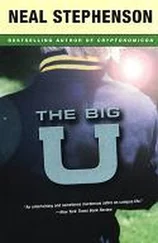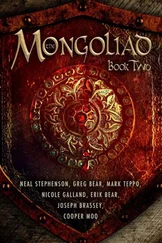Neal Stephenson - The Mongoliad - Book One
Здесь есть возможность читать онлайн «Neal Stephenson - The Mongoliad - Book One» весь текст электронной книги совершенно бесплатно (целиком полную версию без сокращений). В некоторых случаях можно слушать аудио, скачать через торрент в формате fb2 и присутствует краткое содержание. Город: Las Vegas, Год выпуска: 2012, ISBN: 2012, Издательство: 47North, Жанр: Эпическая фантастика, Фэнтези, на английском языке. Описание произведения, (предисловие) а так же отзывы посетителей доступны на портале библиотеки ЛибКат.
- Название:The Mongoliad: Book One
- Автор:
- Издательство:47North
- Жанр:
- Год:2012
- Город:Las Vegas
- ISBN:978-1-61218-236-0
- Рейтинг книги:5 / 5. Голосов: 1
-
Избранное:Добавить в избранное
- Отзывы:
-
Ваша оценка:
- 100
- 1
- 2
- 3
- 4
- 5
The Mongoliad: Book One: краткое содержание, описание и аннотация
Предлагаем к чтению аннотацию, описание, краткое содержание или предисловие (зависит от того, что написал сам автор книги «The Mongoliad: Book One»). Если вы не нашли необходимую информацию о книге — напишите в комментариях, мы постараемся отыскать её.
The Mongoliad: Book One — читать онлайн бесплатно полную книгу (весь текст) целиком
Ниже представлен текст книги, разбитый по страницам. Система сохранения места последней прочитанной страницы, позволяет с удобством читать онлайн бесплатно книгу «The Mongoliad: Book One», без необходимости каждый раз заново искать на чём Вы остановились. Поставьте закладку, и сможете в любой момент перейти на страницу, на которой закончили чтение.
Интервал:
Закладка:
“No,” Ögedei managed. “I can’t allow—”
Tolui shook his head. “Father told me to watch over you, Ögedei. Is that not what I have done? When you forgot your lessons, where was I? When you dozed off, who prodded you awake? Who took care of Father’s empire while the tribes squabbled and whined about declaring you Khagan ? I gave it to you gladly when it was time because I knew you, of all our brothers, to be the wisest and most capable. You were Father’s choice, and it has always been—and will always be—my greatest duty and honor to stand by you.” His eyes were bright and wet. “If you die, we will be lost. We will be weak and helpless while the tribes gather for the kuraltai and pick a successor, like an orphaned child who crawls from its ger to find its family devoured by predators.”
“It should be you, Tolui. You would make a fine Khagan .”
“Compared to you?” Tolui shook his head. “The gods fear you, my brother. Look how desperate they are to destroy Father’s dream—your dream.” He squeezed Ögedei’s hand, forestalling any argument. “I have already decided. The shamans will perform the ritual. Let me do this for you. Let me serve my Khan in the best way that I can.”
Silence had fallen in the tent, and Ögedei struggled to look around. There were more shamans than he thought the ger could hold. They all wore blue robes, and they had traded their drums and divining bones for cups and deer horns and carved wooden rods. He tried to extricate his hand from Tolui’s grip, but his younger brother held him fast. He could not sit up; he could not speak. His strength was gone, and he fell back against the sweat-stained furs. They wrapped around him like wet snow, and dark demon patterns danced at the edge of his vision…
The shamans were chanting, and the tent was illuminated by the light from four braziers burning fragrant pinewood. Had time passed? Tolui was no longer at the side of his bed, and his hand—the one so recently held by his brother—was cold and cramped. When Ögedei blinked, one of the braziers went out; in quick succession they were extinguished, and great billowing clouds of smoke began to obscure the chanting shamans.
A greasy tendril of smoke passed over his face. He reached out to touch it, but there was nothing there, nothing but a vast emptiness, as if he lay naked on the steppes and the stars had all winked out.
He could smell blood, like a fresh kill, and thought of the deer by the river—the one he had killed with his father so many years ago.
The chanting stopped, and then shamans whooped and yipped, a wolf pack cacophony.
Ögedei could not remember closing his eyes, and opening them was like lifting an iron gate. Little by little, he managed to raise his eyelids, squinting and blinking even though there was little light in the tent.
The shamans were chanting again, muttering and humming under their breath—whispers on the wind. Tolui had returned and he stood at the foot of the bed. His head was lowered, and the sound coming from his throat sounded like the noise of ten men, droning and crying. A wooden cup was passed from shaman to shaman, until it reached his brother, who accepted it, squatted next to Ögedei’s feet, and raised it to his lips.
He drank and drank and drank. It seemed as if he would never stop drinking, and Ögedei was about to cry out for him to stop, when he dropped the bowl and fell heavily against the bed. He raised his head, his bright eyes piercing Ögedei. His mouth worked for some time before words came out, and when they did, Ögedei wanted to cry out, to drive them back into his brother’s throat as if that would undo what had been done. “Bring greatness to our empire, brother,” he whispered.
Ögedei sat up. His spirit was returning in prickly waves running through his limbs. “Tolui,” he cried, his voice a hoarse gasp.
Tolui groaned, then doubled over, his hands clutching at nothing. When he looked again at Ögedei, the veins of his brow swelled purple and tight under the sweat-slicked skin. “Brother,” he whispered, his voice a ragged hiss, “they drink me.” All the skin of his face now stretched tight, like the head of a drum, and Ögedei could see things moving beneath—like worms burrowing.
“I am drunk,” Tolui sighed. He tried to shape one last smile for his older brother, but his muscles failed him and he collapsed in a heap.
Ögedei threw off the furs. Finding he could stand, he rushed to his brother’s side.
A shaman stood to one side, half in shadow. “It is done,” he pronounced in a hollow, distant voice.
Tolui’s eyes were closed, as if he had fallen into a deep sleep. Ögedei hugged him tightly, but there was no life left in his brother’s body.

“On this day nine years ago, my noble brother sacrificed himself so that I might live. But his sacrifice was not just for me! Tolui…Tolui Khan sacrificed himself so the Mongol Empire would not be denied its leader—or its destiny.”
Surrounded by more than a minghan of ecstatic and effusive warriors, it was easy to be infected by their enthusiasm, and when the crowd roared in approval following the Khagan ’s words, Gansukh found himself halfheartedly cheering along.
The courtyard was removed enough from Ögedei’s balcony that it was not easy to tell if the Khagan had been drinking. Certainly, at this distance, one could not make out any of the telltale details in a man’s face that betrayed intoxication, but based on the Khagan ’s cadence and the way he leaned heavily on the balcony railing while the crowd cheered, Gansukh suspected the Khagan was, indeed, besotted.
“We must never forget my dear brother’s spirit,” Ögedei continued, pulling himself upright again. “His strength is our strength; his spirit is with us still. His name, and the names of all our fallen brothers, are what make us who we are. Those who stand against the empire—those who defy me—defile the memory of our dead brothers.”
Ögedei paused dramatically, and as the noise of the crowd filled the courtyard, he raised his arms, urging them to even greater volume. The ground rumbled as men began to stomp rhythmically. This time, when the Khagan dropped his hands, silence came slowly.
“It is due to my brother,” Ögedei shouted in a ringing voice, “and to your brothers, and all the fallen Mongol brothers, that our empire endures. My father brought the tribes together and set us upon a course that will forever carve a furrow in history. It is our duty—our sacred duty for our brothers who will follow after us—to continue that course.”
The crowd’s cheers grew louder, more guttural, becoming a war chant. The noise flowed back and forth, beating against the walls of the palace, and above the seething tide of shouting warriors, Ögedei faltered. Gansukh’s heart faltered with him. But the crowd did not notice as Ögedei steadied himself, and Gansukh saw someone move behind Ögedei and the sharp shooing motion of his hand as the Khagan brushed off any assistance.
The crowd continued its exultation, but Gansukh had seen enough. As Ögedei began to quiet the shouting warriors for one final declamatory exclamation, Gansukh shoved his way through the crowd.
The Khagan ’s greatness had not departed. The wine addled him, but it had not entirely doused Ögedei’s fierce spirit. The Khagan could still be saved, but it would require someone like Gansukh—an outsider, a warrior for whom the old ways were still fresh and vital—to show him the path.
Learning the ways of court were a means to an end, much like learning how to read tracks and spoor in order to hunt. A hunter had to know his prey well before he could stalk it, before he could get close enough.
Читать дальшеИнтервал:
Закладка:
Похожие книги на «The Mongoliad: Book One»
Представляем Вашему вниманию похожие книги на «The Mongoliad: Book One» списком для выбора. Мы отобрали схожую по названию и смыслу литературу в надежде предоставить читателям больше вариантов отыскать новые, интересные, ещё непрочитанные произведения.
Обсуждение, отзывы о книге «The Mongoliad: Book One» и просто собственные мнения читателей. Оставьте ваши комментарии, напишите, что Вы думаете о произведении, его смысле или главных героях. Укажите что конкретно понравилось, а что нет, и почему Вы так считаете.







